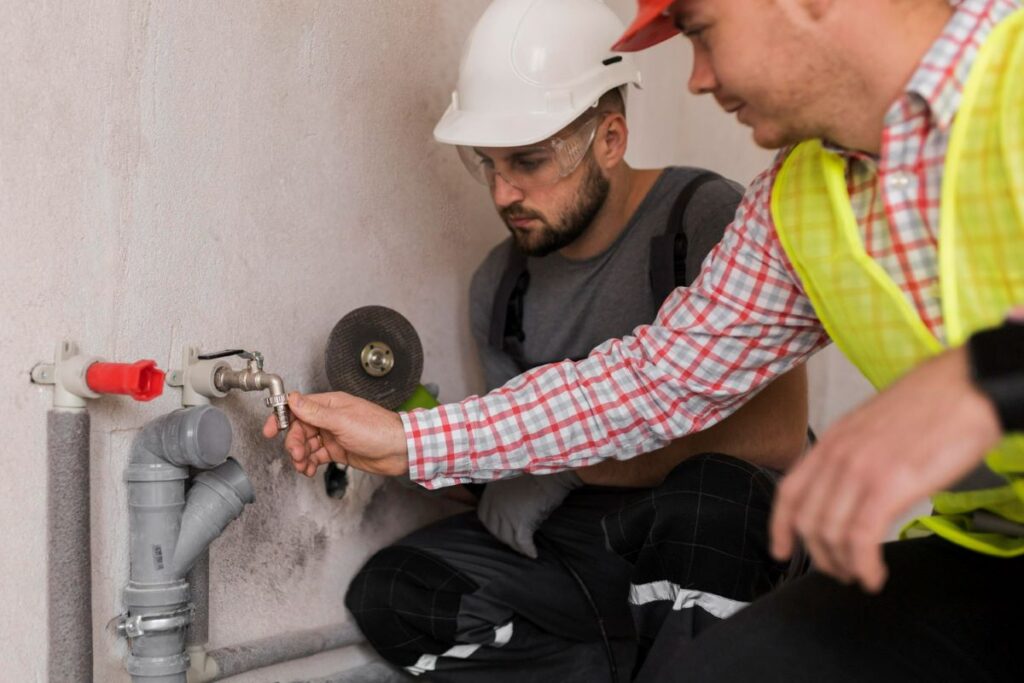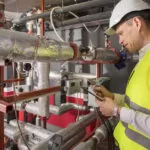When it comes to construction and building projects, plumbing engineering is a fundamental aspect that requires meticulous planning and execution. Plumbing Project Management plays a pivotal role in ensuring that water supply, drainage, and sewage systems function seamlessly within a structure. In this article, we’ll explore the world of Plumbing Project Management, its significance, and how it contributes to the successful completion of construction projects.
Table of Contents
Introduction
Plumbing is an essential part of any building, ensuring the flow of clean water and the removal of waste. Plumbing Project Management is the process of planning, organizing, and overseeing plumbing installations in construction projects, ensuring that they meet safety and efficiency standards.

Plumbing Project Management is a critical component of construction, as it ensures that the plumbing systems within a building are designed, installed, and maintained to function optimally. It encompasses various stages, from the initial planning and design to procurement, installation, and quality control. Effective Plumbing Project Management is vital not only for the functionality and safety of a building but also for its long-term sustainability.
What is Plumbing Project Management?
Plumbing Project Management involves coordinating all plumbing-related activities from the initial design phase to the final installation and inspection. It requires a deep understanding of plumbing systems, regulations, and project management principles.
Plumbing Project Managers are responsible for ensuring that the plumbing systems meet building codes, safety standards, and environmental regulations. They work closely with architects, engineers, contractors, and subcontractors to develop comprehensive plumbing plans and schedules. Moreover, they oversee the procurement of materials and equipment, manage labor resources, and ensure that the plumbing work adheres to the approved design and quality standards. Effective communication and problem-solving skills are essential attributes for a successful Plumbing Project Manager.
The Importance of Efficient Plumbing
Efficient plumbing systems are crucial for the comfort and well-being of building occupants. A well-managed plumbing project ensures that water supply is reliable, drainage is efficient, and wastewater is properly disposed of, reducing the risk of health hazards and property damage.
Efficient plumbing also contributes to water conservation and sustainability. Plumbing Project Managers play a pivotal role in specifying water-saving fixtures, systems, and technologies that reduce water consumption in buildings. This not only benefits the environment by conserving a precious resource but also leads to cost savings for building owners and occupants over time. In this way, Plumbing Project Management is closely aligned with the broader goals of environmental responsibility and resource efficiency.
The Role of a Plumbing Project Manager
A Plumbing Project Manager plays a multifaceted role in construction projects. They are responsible for:
- Collaborating with architects and engineers to design plumbing systems.
- Procuring materials and resources.
- Managing a team of plumbers and technicians.
- Ensuring compliance with building codes and regulations.
- Overseeing installation and quality control.
- Managing project timelines and budgets.
In essence, the Plumbing Project Manager is the linchpin that holds the plumbing project together. They bridge the gap between the technical aspects of plumbing design and the practical aspects of implementation, ensuring that the plumbing systems meet all necessary standards while staying on schedule and within budget.
Planning and Design Phase
The planning and design phase is where the foundation of a plumbing project is laid. Plumbing Project Managers work closely with architects and engineers to create detailed plans that specify the layout of pipes, fixtures, and drainage systems. This phase also involves obtaining necessary permits and approvals.
During this phase, Plumbing Project Managers consider various factors, including the building’s layout, the number of occupants, water source availability, and local plumbing codes. They also take sustainability into account, looking for opportunities to incorporate water-saving fixtures and environmentally friendly plumbing technologies into the design.
Procurement and Resource Management
Efficient procurement is essential to ensure that the right materials and equipment are available when needed. Plumbing Project Managers are responsible for identifying suppliers, obtaining quotes, and procuring materials and fixtures that meet project specifications and budget constraints.
Additionally, resource management is a critical aspect of Plumbing Project Management. Project Managers must ensure that they have an adequate workforce of skilled plumbers and technicians to carry out the installation work efficiently. Effective resource management involves scheduling, coordinating, and supervising the plumbing team to ensure that the project stays on track.
Installation and Quality Control
The installation phase is where the plumbing project takes shape. It involves the precise installation of pipes, fixtures, and drainage systems according to the approved plans. Quality control is crucial to identify and rectify any issues before they escalate.
Plumbing Project Managers oversee the installation process, ensuring that all work is carried out to meet safety, quality, and compliance standards. They conduct inspections and tests to verify that the plumbing systems function as intended, and they address any deviations promptly to avoid costly rework.
Challenges in Plumbing Project Management
Challenges in plumbing projects can range from unexpected site conditions to compliance issues. Plumbing Project Managers must be adept at problem-solving and adapting to changing circumstances to keep the project on track.
Unforeseen issues, such as hidden structural obstacles or unforeseen soil conditions, can disrupt the plumbing installation process. Moreover, changes in local plumbing codes or regulations can require adjustments to the project plan. Effective communication and a proactive approach to problem-solving are crucial to overcome these challenges and ensure project success.
Technological Advancements
Advancements in technology have transformed Plumbing Project Management. Tools such as Building Information Modeling (BIM) and project management software streamline processes, enhance communication, and improve project efficiency.
Building Information Modeling (BIM) allows Plumbing Project Managers to create digital representations of plumbing systems within the context of the entire building. This technology enables better visualization and coordination among different trades, reducing conflicts and errors during construction.
FAQs
What qualifications are needed to become a Plumbing Project Manager?
To become a Plumbing Project Manager, one typically needs a bachelor’s degree in construction management or a related field, along with relevant plumbing certifications and several years of experience.
Becoming a Plumbing Project Manager requires a combination of education, experience, and specialized training. Most Plumbing Project Managers hold a bachelor’s degree in construction management, engineering, or a related field. Additionally, they often obtain plumbing certifications or licenses, which vary by region and may include examinations and practical experience requirements.
In addition to formal qualifications, effective communication and problem-solving skills are crucial for Plumbing Project Managers. They must be able to collaborate with architects, engineers, contractors, and plumbers, translating design plans into actionable steps and resolving any issues that arise during the project.
How does Plumbing Project Management differ in residential and commercial projects?
Residential and commercial plumbing projects may differ in scale and complexity. Commercial projects often involve larger systems and more extensive planning and design.
In residential Plumbing Project Management, the focus is typically on single-family homes, multi-family buildings, or small-scale renovations. The plumbing systems are designed to meet the needs of individual households, and the project management approach may be more straightforward.
In contrast, commercial Plumbing Project Management often deals with larger buildings, such as office complexes, hotels, or industrial facilities. These projects may require more complex plumbing systems, and coordination with multiple stakeholders is essential. Commercial projects also often involve compliance with stricter regulations and standards due to higher occupancy levels.
What are common challenges faced in plumbing projects?
Common challenges include unexpected site conditions, regulatory compliance issues, and coordination with other trades on the construction site.
Unforeseen site conditions, such as the discovery of underground obstacles or unsuitable soil conditions, can disrupt the planned plumbing installation. Plumbing Project Managers must be prepared to adapt and make necessary adjustments to keep the project on schedule and within budget.
Regulatory compliance is another challenge, as plumbing projects must adhere to local building codes and regulations. Changes in regulations or permitting delays can impact project timelines and require adjustments to the plumbing design.
Coordination with other trades, such as electrical, HVAC, and structural, is critical to ensure that all components of the building work together seamlessly. Effective communication and collaboration among different project teams are essential to prevent conflicts and delays.
How can technology improve Plumbing Project Management?
Technology tools like BIM and project management software enhance communication, streamline processes, and improve overall project efficiency.
Building Information Modeling (BIM) is a powerful tool that allows Plumbing Project Managers to create digital representations of plumbing systems within the context of the entire building. This technology enables better visualization and coordination among different trades, reducing conflicts and errors during construction.
Project management software helps Plumbing Project Managers track project progress, manage schedules, and communicate with team members and stakeholders. It provides a centralized platform for sharing project documents, specifications, and updates, enhancing collaboration and transparency.
Mobile apps and field technology also enable real-time communication between on-site plumbers and project managers, facilitating quick decision-making and issue resolution.
What are some sustainable practices in plumbing projects?
Sustainable plumbing practices include the use of water-saving fixtures, efficient water heating systems, and rainwater harvesting to reduce water consumption and environmental impact.
Water-saving fixtures, such as low-flow toilets, faucets, and showerheads, reduce water usage without compromising performance. These fixtures are designed to meet strict efficiency standards and can significantly reduce water bills for building owners and occupants.
Efficient water heating systems, such as tankless water heaters and heat pump water heaters, use less energy to heat water, reducing both energy costs and greenhouse gas emissions.
Rainwater harvesting involves collecting and storing rainwater for non-potable uses, such as irrigation and toilet flushing. This practice reduces the demand on municipal water supplies and conserves water resources.
Additionally, Plumbing Project Managers can design plumbing systems that minimize water waste, detect leaks, and incorporate water treatment technologies to improve water quality. By integrating these sustainable practices into plumbing projects, they contribute to environmental conservation and resource efficiency.
Conclusion
Plumbing Project Management is the linchpin of successful plumbing installations in construction projects. Its importance in ensuring efficient water supply, drainage, and waste management cannot be overstated. With the right Plumbing Project Manager and modern tools at their disposal, construction projects can deliver plumbing systems that meet the highest standards of safety and functionality.




